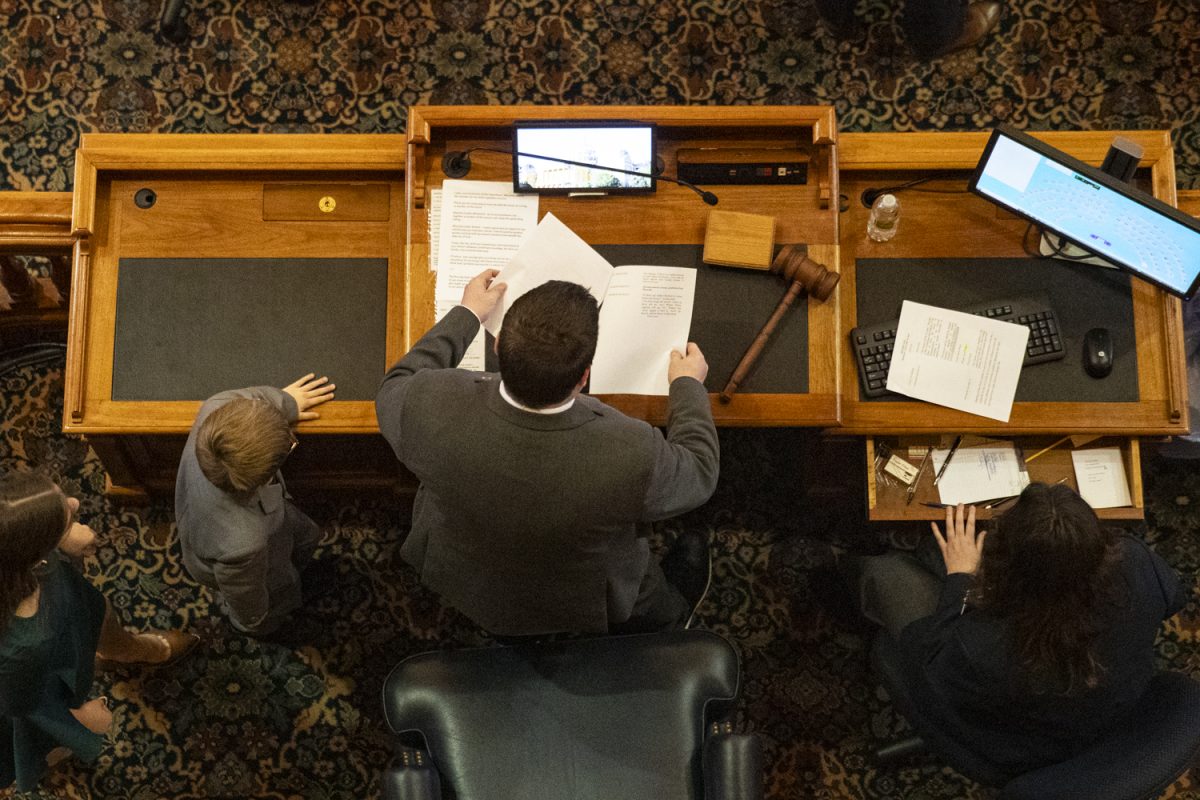Iowa Senate lawmakers killed several Iowa Gov. Kim Reynolds and House Republicans legislative priorities this week after failing to advance a slew of bills past a critical deadline on Friday.
Reynolds’ proposals to define “man” and “woman” in Iowa Code, change the state rule making process, and a bill to provide over-the-counter birth control were axed by lawmakers this week.
Several House Republicans education bills were also killed, including a bill to reform Iowa’s social studies curriculum, and a bill to cap tuition, among other reforms, at Iowa’s three public universities.
House bills that didn’t advance out of Senate Committees and Senate bills that didn’t advance out of House committees are effectively “dead,” but several procedural tools can be utilized by Iowa House and Senate leadership to revive any “dead” bills. Legislative deadlines don’t apply to tax and spending bills.
Legislative leaders, including Senate Democratic Leader Pam Jochum, D-Dubuque, said this year’s second funnel was unusual. Lawmakers are normally frenzied to pass key legislative priorities last minute, but this week was moderately paced, Jochum said.
The Senate passed 51 bills out of the chamber so far this session, while the House passed 150 bills.
Iowa Senate Republicans Leader Jack Whitver, R-Grimes, told reporters, according to The Cedar Rapids Gazette, that the number of bills House lawmakers passed was unnecessary.
“I think Iowa’s in a really good spot, and we don’t need that many bills, in my opinion, to make Iowa strong and to keep Iowa strong,” Whitver said to The Gazette. “And so, we don’t need to pass 200 bills, 300 bills to keep Iowa strong.”
Jochum, of Senate Democrats, said this week was “bizarre.”
“… I’ve been through a few funnel weeks in my lifetime,” Jochum said. “We have had subcommittees canceled, we’ve had committee meetings canceled. We really don’t know what [Senate Republicans are] up to.”
House Republicans leader Pat Grassley, R-New Hartford, said he was hoping to push for the Senate to reconsider some proposals axed by the funnel deadline.
“There’s been some issues that we’ve brought forward at the beginning of the session that we passed over early enough that didn’t see the light of day, that we feel … need to be continued as part of the ongoing conversations between the House and the Senate,” Grassley said to The Gazette.
House Democratic Leader Jennifer Konfrst, D-Windsor Heights, said from her view, Republicans should be working together more.
“We’re seeing bills get put on calendars to be used as negotiating pieces, or other things that are going to get passed or not,” Konfrst said. “And I would like to remind everyone that Republicans have the trifecta. They should be able to have this workout smoothly.”
Both House and Senate Republican leaders used the unfinished business calendar to keep dozens of bills alive despite not making the deadline.
Packed Agenda, AEA bill deliberations ahead for lawmakers
Now, lawmakers must navigate the final weeks of the legislative session with the governor’s key priority, her proposed reform of Iowa’s Area Education Agencies, and the state’s several billion-dollar budget.
The governor’s proposal has seen opposition from Democrats and Republicans alike, with House Republicans scrapping her bill and proposing their own that dramatically scales back the reforms the governor proposed. Senate lawmakers advanced their own proposal that is similar to the governor’s proposal but cut back on several of the provisions.
Whitver said the Senate is working to get their bill ready for the floor and working on finding consensus between the chambers and the governor.
“Our bill is vastly different than the governor’s original bill, it’s vastly different than the House, and so that’s what makes it a little bit harder,” Whitver said, according to the Gazette. “We’ve got to get our own bill off the floor, hopefully soon, to really start that conversation to see where it ends.”
Grassley, of House Republicans, said the House feels strongly about their bill, with the majority of the caucus supporting the bill during debate in the House.
“Right now, we’re having good conversations,” Grassley said. “We feel pretty strongly that whatever we do with AEAs, we’ve been very clear in the House we wanted to continue to provide certainty for special ed, parents, and students and school districts.”
The State’s Revenue Estimating Conference projected on Friday that the state will collect nearly $9.6 billion in income tax this fiscal year.
The conference’s meeting usually kicks off the state’s budgeting process, Reynolds released her $8.9 billion budget proposal in January.



